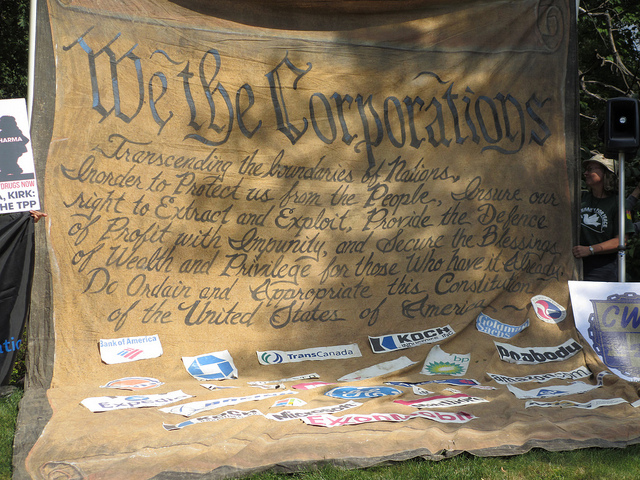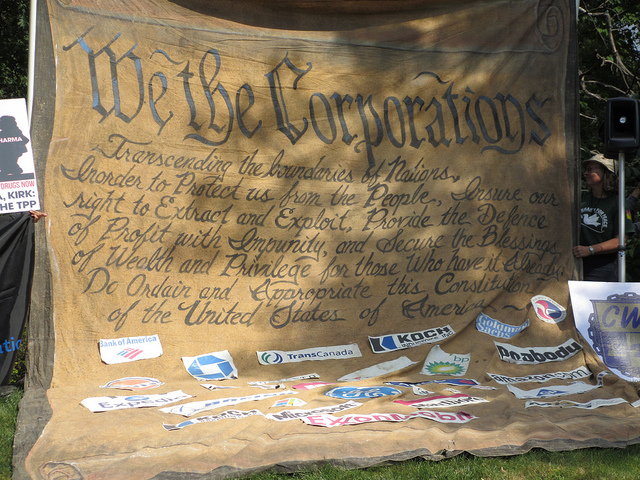
Honest, paywall-free news is rare. Please support our boldly independent journalism with a donation of any size.
 There has been a troubling lack of transparency in TPP negotiations, with consultations taking place behind closed doors. If Congress were to grant the president fast track authority, the largest trade agreement in world history might get enacted into law without any meaningful debate. (Photo: GlobalTradeWatch)
There has been a troubling lack of transparency in TPP negotiations, with consultations taking place behind closed doors. If Congress were to grant the president fast track authority, the largest trade agreement in world history might get enacted into law without any meaningful debate. (Photo: GlobalTradeWatch)
As with previous free trade agreements, the Trans-Pacific Partnership would likely harm rather than benefit American workers, hurt the US economy and not help workers in other countries.
The Trans-Pacific Partnership (TPP), a multilateral trade deal currently being negotiated by the United States and 11 other Pacific Rim countries, would significantly expand the Trans-Pacific Strategic Economic Partnership Agreement, which was ratified in 2005.
Business organizations, Republicans lawmakers and some Democrats favor giving the president “fast track” authority to get any deal reached by the Obama administration approved with limited congressional review under a statutory mechanism known as trade promotion authority.
The president needs Congress to grant him this authority, but lawmakers should oppose fast track on the TPP. As with previous free trade agreements (FTAs), the TPP would likely harm rather than benefit American workers and hurt the US economy.
Below are five reasons that lawmakers should oppose the TPP.
• FIRST, despite presidential promises of job gains, previous FTAs have resulted in lost jobs, stagnant wages, increasing inequality and other negative consequences for workers. On the 20th anniversary of the 1994 North American Free Trade Agreement (NAFTA), the Economic Policy Institute (EPI) estimated that almost 700,000 US jobs had been lost as a direct result of the agreement. (In 1993, President Clinton claimed that NAFTA would create a million jobs in its first five years of operation.)
Nearly 60,000 job losses can be attributed to the 2012 US-Korea FTA, EPI reports. Secretary of State John Kerry and Agriculture Secretary Tom Vilsack insist that the TPP would support 650,000 jobs in the United States, but the Washington Post’s Fact Checker awarded their “illusionary” job claims four Pinocchios for “fishy math.”
• SECOND, several countries involved in the TPP have long violated fundamental labor rights. The worst offender is Vietnam, whose government has refused to allow workers the freedom to form unions. Vietnam’s senior advisor on international integration negotiations has stated in negotiations that Vietnam could “not accept [the right to establish unions] requirement.”
Vietnam’s General Confederation of Labor and affiliated unions are essentially appendages of the governing Communist Party, not independent worker organizations. Vietnam also has poor labor conditions, with workers in export manufacturing factories being exposed to hazardous chemicals and blocked emergency exits. Child and forced labor has been used in the textile and brick sectors in Vietnam.
Other TPP countries have problematic labor records. In Mexico, violations of freedom of association are widespread, and child labor and forced labor are problems; in Malaysia, electronics and other goods are produced using child and forced labor, according to the US Department of Labor; in Peru, child and forced labor are commonplace; and in Brunei, which recently adopted Sharia law, the exploitation of foreign workers and discrimination against women are endemic.
US workers should not face unfair competition from countries that systematically violate workers’ rights, or lack the capacity to enforce their own laws or investigate violations. Unless these countries strengthen the protection of fundamental labor rights, corporations will likely shift more US jobs overseas under the TPP.
• THIRD, even as US workers have lost out, workers in less developed countries have not benefitted from previous FTAs. Indeed, in several cases, these workers have seen conditions deteriorate further. The Colombian government has failed to curb widespread violence against union activists under the 2011 “Labor Action Plan” of the US-Colombia agreement. So far, 73 unionists have been murdered under the agreement.
Neither has the Colombian agreement delivered on promises to improve labor conditions. Labor abuses continue in Guatemala under the 2005 US-Dominican Republic Central America Free Trade Agreement (CAFTA-DR). As a result of the Guatemalan government’s failure to effectively enforce its own labor laws in more than 400 instances, the Office of the US Trade Representative initiated the first-ever labor dispute through a FTA in September 2014 – a complaint that was first filed six years ago.
CAFTA-DR has hurt Honduras‘ economy and contributed to recent waves of emigration. At least 31 unionists and 112 rural workers have been murdered in Honduras, and workers are routinely subjected to egregious abuses, according to a report released by the AFL-CIO in January. In recent years, labor violations have been getting worse, the government has weakened labor law, and the amount of permanent work has been reduced. FTAs have not improved respect for fundamental labor rights or uplifted standards, and TPP is unlikely to help workers in poor Asian countries.
• FOURTH, if previous experience is any guide, TPP will likely protect the rights of large investors and corporations at the expense of workers. US Trade Representative Michael Froman insists that won’t happen and that TPP’s labor chapter will cover child and forced labor, special economic zones, and labor standards, including minimum wages, maximum hours and other workplace conditions.
But past assurances have counted for little, especially when workers’ interests clash with the demands of powerful corporations and investors for weaker regulations (“non-tariff barriers to trade”). Labor obligations are rarely subjected to the same enforcement mechanisms as commercial provisions, and corporate rights always trump workers’ rights. There is little reason to believe it will be different this time round.
Finally, there has been a troubling lack of transparency in TPP negotiations, with consultations taking place behind closed doors. If Congress were to grant the president fast track authority, the largest trade agreement in world history might get enacted into law without any meaningful debate. Unless labor rights become more central to trade negotiations, FTAs will continue to hurt American workers, not benefit them.
The administration should ensure that labor standards under FTAs at least conform with the International Labor Organization’s Declaration on Fundamental Principles and Rights At Work, which guarantees freedom of association, the right to collectively bargain, the abolition of child labor and forced labor, and the elimination of discrimination in employment, and it must strengthen and streamline enforcement mechanisms.
US workers have already suffered from decades of stagnating wages as a result of this nation’s poor record upholding international standards on freedom of association and the right of collective bargaining. The last thing workers need is an enormous trade agreement with nations that have even worse labor rights records.
Congress should oppose fast track authority and ensure strong and enforceable labor standards in any future FTAs.
Media that fights fascism
Truthout is funded almost entirely by readers — that’s why we can speak truth to power and cut against the mainstream narrative. But independent journalists at Truthout face mounting political repression under Trump.
We rely on your support to survive McCarthyist censorship. Please make a tax-deductible one-time or monthly donation.